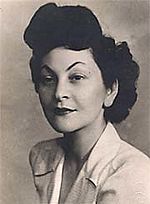Doria Shafik facts for kids
Quick facts for kids
Doria Shafiq
درية شفيق |
|
|---|---|
 |
|
| Born | 14 December 1908 Tanta, Egypt
|
| Died | 20 September 1975 (aged 66) Cairo, Egypt
|
| Nationality | Egyptian |
| Occupation | author, feminist, revolutionary |
Doria Shafik (Arabic: درية شفيق; 14 December 1908 – 20 September 1975) was an Egyptian writer, poet, and editor. She was a major leader in the women's liberation movement in Egypt during the 1940s. Thanks to her hard work, Egyptian women gained the right to vote in their country's constitution.
Contents
Early Life and Education
Doria Shafik was born on December 14, 1908, in Tanta, Egypt. She went to a French primary school in Tanta. Later, she studied in Cairo. At 18, she was one of the first Egyptian girls to finish secondary school.
She earned a scholarship from the Egyptian Ministry of Education. This allowed her to study at Sorbonne University in Paris. There, she earned a PhD in philosophy. She wrote two important papers for her degree. One paper discussed ancient Egyptian art. The other argued for equal rights for women. She received high honors for her studies. While in Paris, Doria married Nureldin Raga'i. He was also a student working on his PhD.
Fighting for Change
When Doria Shafik returned to Egypt in 1940, she wanted to teach. However, Cairo University did not hire her. They said she was "too liberal."
Starting Magazines
In 1945, Doria became the editor-in-chief of La Femme Nouvelle. This was a French magazine for important people in Egypt. After the owner passed away, Doria took full charge. The magazine became very popular in the region.
Also in 1945, Doria started an Arabic magazine called Bint Al Nil. This name means Daughter of the Nile. She wanted to educate Egyptian women. She also wanted to help them play a bigger role in their families and society. The first issue was released in November 1945 and sold out quickly.
The Bint Al Nil Union
In 1948, Doria Shafik created the Bint Al Nil Union. This group worked to solve social problems for women. It also aimed to include women in their country's decisions. The union opened centers across Egypt to teach people to read and write. They also set up an employment office and a cafeteria for working women.
Protesting at Parliament
In February 1951, Doria secretly gathered 1500 women. These women were from two main feminist groups. They marched and stopped Parliament for four hours. They demanded better social and economic rights for women. Doria was taken to court for this. But many supporters came to court, and the case was put off. Even with promises from the Senate, women's rights did not improve.
Forming a Women's Unit
In 1951, Doria Shafik started a special unit for the Daughters of the Nile. It was like a uniformed group. In January 1952, she led members to surround a Barclays Bank branch. They shut it down for a time. She was arrested when the protest became noisy.
The Bint Al Nil Party
After the Egyptian Revolution of 1952, Doria Shafik asked the government to recognize Bint Al Nil as a political party. The government agreed, and Doria Shafik became its president.
First Hunger Strike
On March 12, 1954, Doria Shafik began an eight-day hunger strike. She did this to protest that no women were on a new committee. This committee was creating the country's constitution. She stopped her strike when President Naguib promised a constitution that respected women's rights.
Traveling the World
Because of the interest her hunger strike created, Doria Shafik was invited to speak. She traveled to Asia, Europe, and the United States. She spoke about Egyptian women. She visited Italy, England, France, the United States, Japan, India, Ceylon, and Pakistan.
Winning the Right to Vote
Thanks to Doria Shafik's efforts, women were given the right to vote. This happened under the constitution of 1956. However, women had to be able to read and write to vote. Men did not have this requirement.
Second Hunger Strike
In 1957, Doria Shafik went on a second hunger strike. This time, it was at the Indian embassy. She was protesting against President Gamal Abdel Nasser's strict government. Because of this, Nasser put her under house arrest. Her name was banned from newspapers, and her magazines were stopped.
Writing and Later Life
Besides her magazines, Doria Shafik wrote a novel. It was called L'Esclave de Sultane (Slave of King). It was about a woman's struggle. She also wrote several poetry books and her own memoirs. Her poetry from her last days was translated. One poem says:
Daughter of the Nile
I have demanded women’s rights
My fight was enlarged to human freedom
And what was the result?
I have no more friends.
So what? Until the end of the road
I will proceed alone.
After her house arrest, Doria Shafik lived a quiet life. She spent her last years reading and writing. She passed away in 1975.
Family Life
Doria Shafik married Nureldin Ragai in Paris in 1937. He became a well-known lawyer in Egypt. He supported all of her efforts. They were married for 31 years and had a daughter named Jehane. Doria Shafik lived a quiet life and was visited by her daughter and grandchildren.
Tributes
On December 14, 2016, Google honored Doria Shafik with a special Doodle. This was for her 108th birthday. The Doodle was seen across the Arab World. In 2018, The New York Times published an obituary for her.
See also
 In Spanish: Doria Shafik para niños
In Spanish: Doria Shafik para niños

